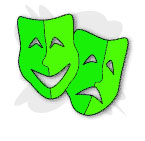

 |
|
||
|
|
A Review
Equestrian Supremacy By R. J. Donovan "War Horse" is a wonder. It's stagecraft is superb and the deceptively simple visuals are phenomenal. In fact, it's the visuals rather than the dialogue that allow the production to soar.
Based on Michael Morpurgo's book of the same name,"War Horse" has been adapted for the stage by Nick Stafford. The storybook quality of the production is a callback to the "once upon a time" bedtime tales of years past. As you watch the story progress, your mind almost spontaneously leans forward with the childlike query, "...And then what happened?) Originally staged by the National Theatre of Great Britain at London's National Theatre, "War Horse" opened on Broadway in 2007, racking up multiple awards and honors including the Tony Award for Best Play. When we first meet Joey as a timid foal in the morning mist, it's clear that what we're seeing onstage is not real. Yet his puppeteers are so adept at movement and expression and sound that it takes only a matter of minutes before you believe you're watching a living, breathing animal galloping across the stage. He snorts, he nuzzles and he gives a flip of his tail with a realism that's so remarkable it's almost human. (Among the gifted puppeteers, Laurabeth Breya, Grayson DeJesus and Nick Lamedica play Joey as a foal, with Christopher Mai, Derek Stratton and Rob Laqui playing Joey as a stallion.)
As the action gets underway, two brothers, Arthur and Ted, are bidding against each other for a horse. Arthur is more well to do, which only makes Ted dig his heels in. He wants that horse. And he's willing to overbid to best his brother. Sibling rivalry causes him to spend that month's mortgage money just to secure bragging rights and win the prize, whether he actually needs it or not. (His long suffering wife is aghast when she learns what's happened, and winds up having to use her charms to hold their creditors at bay.) Ted gives the horse to his young son Albert. Unfortunately, Ted is a stubborn man who never learns. Again and again he makes decisions based on ego and blind desire, no matter the devastation to his family and finances. At one point, he bets against the odds that Joey can be turned into a plow horse. Working together, Albert and Joey succeed, but just barely. Ted later has a chance to cash in by selling Joey to the army cavalry (where he will be given to the previously noted Lieutenant Nicholls). This despite Ted having given his son his word he would never have to part with the horse. Desperate for money, he sells the horse anyway, tearing his family apart. Heartbroken by his father's betrayal, Albert runs away. Although not old enough to enlist, he makes it his mission to join the army to find his beloved horse on the battlefield.
The simple but effective staging includes everything from farmhouses exploding to tanks rolling towards the audience. Credit goes to designer Rae Smith for sets and drawings, the original lighting design by Paule Constable, and the artful animation and projections by 59 Productions that take us from the gentle hills of Devon, to a harrowing crossing of The English Channel to the stark battlefields of France. Adding enormously to the presence of the evening is the haunting score by Adrian Sutton and John Tams that punctuates much of the action, along with troubadour/vocalist John Milosich who provides transition between many of the scenes. Andrew Ventura (top photo) plays the role of Albert with youthful determination. As Ted, Todd Cerveris is full of boisterous rage and regret. His wife Rose, played by Angela Reed, remains the voice of reason in their arduous relationship. Directed on tour by Bijan Sheibani, "War Horse" is filled with moments of great emotion and power. When Joey the young foal suddenly grows to Joey the majestic stallion in an almost cinematic flash of stage magic, the effect is breathtaking. And during a later battle scene when Joey is alone on stage caught in a blur of barbed wire, you can almost feel the animal's agony. Despite the second act being a bit long, when Albert and Joey are finally reunited, the scene was so heartfelt, there were audible sobs in the audience. (Even if you already know the circumstances under which Joey and Albert find each other, you'll find it difficult to hold it together when the moment comes.) In the end, the once upon a time story is resolved, courage and loyalty win out, and despite the odds, an incredible bond between man and gentle beast endures. "War Horse " is at The Boston Opera House through October 21. For information, call 1-800-982-2787. -- Production Photos© Brinkhoff/Mögenburg -- OnStage Boston 10-18-12
|
||||
To
receive an email Update when new pages are posted at OnStage Boston, click
here. |
|||||
©
2002-2004 RJD Associates. All Rights Reserved. No portion of this site may be reprinted or reproduced without prior written permission. |
|||||